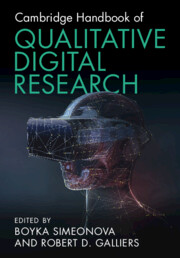Book contents
- Cambridge Handbook of Qualitative Digital Research
- Cambridge Handbook of Qualitative Digital Research
- Copyright page
- Contents
- Figures
- Tables
- Contributors
- Preface
- Part I Philosophical, Epistemological and Theoretical Considerations
- Part II Methodological Considerations
- Chapter 7 Human Values in a Digital-First World: The Implications for Qualitative Research
- Chapter 8 One Picture to Study One Thousand Words
- Chapter 9 Demystifying the Digital
- Chapter 10 Case Study Research Revisited
- Chapter 11 Social Media Qualitative Research Vignettes
- Chapter 12 Co-Inquiring in a Digital Age
- Part III Illustrative Examples and Emergent Issues
- Index
- References
Chapter 7 - Human Values in a Digital-First World: The Implications for Qualitative Research
from Part II - Methodological Considerations
Published online by Cambridge University Press: 08 June 2023
- Cambridge Handbook of Qualitative Digital Research
- Cambridge Handbook of Qualitative Digital Research
- Copyright page
- Contents
- Figures
- Tables
- Contributors
- Preface
- Part I Philosophical, Epistemological and Theoretical Considerations
- Part II Methodological Considerations
- Chapter 7 Human Values in a Digital-First World: The Implications for Qualitative Research
- Chapter 8 One Picture to Study One Thousand Words
- Chapter 9 Demystifying the Digital
- Chapter 10 Case Study Research Revisited
- Chapter 11 Social Media Qualitative Research Vignettes
- Chapter 12 Co-Inquiring in a Digital Age
- Part III Illustrative Examples and Emergent Issues
- Index
- References
Summary
How should human values be integrated into the studies of digital qualitative research? This chapter proposes an answer to this question. It discusses the implications for qualitative researchers of human values in a digital-first world. In a digital-first world, digital technologies are simply taken for granted, and people see the world through digitally computed reality. The chapter offers a way to address the question of including human values in qualitative research in a digital society. It provides basic definitions of key concepts and illustrates them using practical examples of how human values are informing digital research from cultural, spiritual and Indigenous perspectives. As the diversity of human values contributes to the richness of meaning and everyday experiences, it is hoped that scholars and students of digital technology will examine, describe and integrate those values in their research. It is suggested that integrating human values in qualitative studies can contribute to interdisciplinarity in research.
Keywords
- Type
- Chapter
- Information
- Cambridge Handbook of Qualitative Digital Research , pp. 91 - 103Publisher: Cambridge University PressPrint publication year: 2023
References
- 3
- Cited by

